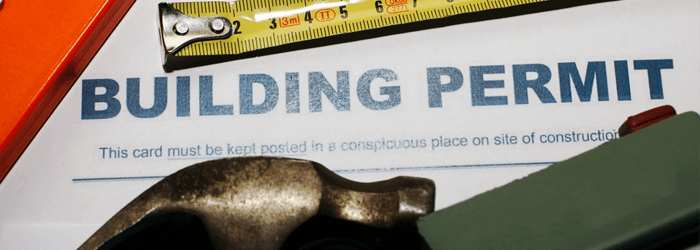You are getting set to work on your latest home improvement project. Before you tear down the walls, move electric and plumbing, or add a room, you’d better have a permit.
A building permit is an official approval by your municipality that allows you, or a hired contractor, to remodel an existing structure or build something new on your property. They ensure homeowners comply with local building codes and standards.
Permits also provide a permanent record of the work performed and inspections conducted on the project.
What a homeowner needs to know about the permitting process.
So, what can be done without a permit? Not much…
If you’re putting in something portable (window-mounted air conditioner, swamp cooler, plug-in appliance) or cosmetic (paint, countertops, flooring), you don’t need one. This list from the Arizona Building Officials outlines the projects that do NOT need a permit.

These projects do require permits:
- Work that involves a load-bearing condition or demolition.
- Changing the use of a room, such as creating a bedroom from a living space.
- Electrical, plumbing, and heating and cooling that goes beyond typical maintenance. That includes moving sinks and toilets.
- Installing a ceiling fan requires a permit, especially if you need to run electrical wiring. This is a safety precaution and is a government mandate.
In most cases, this is the permit process:
- Verify what building department jurisdiction you are bound by; a particular city or the county. Click here for a list. Contact the building office or clerk in your municipality. Explain the entire construction plan so they can determine what permit(s) are needed or if you need to make an appointment for further discussion. Have your Assessor’s Parcel Number (APN) handy. This is a number unique to your parcel of property and can be obtained from your local County Assessor’s Office.
- Fill out the permit application form. You may need to provide additional documentation such as drawings, proof of insurance or bonds.
- Submit the permit fee(s) with the application. The fees are typically calculated and based on the value of the work. Building officials consult a value chart to establish the fees. Permit fees and valuation tables are available at your local Building Department. For some remodel projects, you will be asked to set the value of the project. The cost of the permit will be determined by the value you set. Some jurisdictions have fees associated with “buy-in or tie-in” for water and sewer should you add new plumbing fixtures. There are also “Impact Fees” that are typically associated with new home construction and are used to offset the costs to the jurisdiction for increased services such as fire, police, roads, and recreation services.
 Once the permit is approved and received, it must be displayed at the construction site.
Once the permit is approved and received, it must be displayed at the construction site.- When you apply for a city permit, it triggers an inspection by a building official who will make sure the work complies with safety and other standards adopted by the city. Those standards usually are based on the minimum requirements, so the inspector isn’t going to insist on more than that. They are there to help keep your home and your family safe.
Failing to get a permit for home improvements can result in a stop-work order and fines. Fines for not pulling a permit vary greatly, depending on where you live. If you get caught doing work without a permit, some jurisdictions will charge twice the normal permitting amount, and could require you to disassemble any work that has been covered without being inspected.
If you have changes to your construction plan, contact the city’s permitting department before constructing those changes.
It doesn’t matter if you get the required city permits for your home’s project or your contractor gets them. In the end, you are responsible for making sure you have them. Don’t assume the contractor has the permits. Ask to see them.
Handyman Jobs
Permits for handyman jobs are extremely easy to get by the homeowner. But here is the caveat: Arizona has a “handyman” exemption. That means an unlicensed person can do work that doesn’t require a permit and doesn’t amount to more than $1,000 in materials and labor costs. This might be a small painting job or a door repair. Contractors must have a license and a permit when modifying electrical or plumbing systems.
Why a permit is important.
Safety is the number one reason why building permits are required. It ensures that all building safety codes and requirements are met.
 Your insurance carrier may void your policy if you build or renovate without proper permits and there is a related structural collapse, fire, or plumbing issue.
Your insurance carrier may void your policy if you build or renovate without proper permits and there is a related structural collapse, fire, or plumbing issue.
Your local government could order you to demolish the project.
When it’s time to sell your house, an unpermitted room addition won’t show up as square footage in official county records, which means your house might not be valued as high as you believe it should be. It is now required by Arizona law to fully disclose all remodeling work and whether or not permits were obtained. Plus, many buyers, and even realtors, are reluctant to deal with a house that’s had work done without a permit. There’s no guarantee that the work was done safely or up to the current building and electrical codes.
Getting the necessary permits is a great way to organize the information you have gathered in your planning process. An inspector can point out a little problem before it becomes a big one.
No matter how simple your home improvement or repair job may be, check with your municipality to see if you need a permit. When in doubt, ask.
###
Homeowner Handbook | #BuildingCodes&Permits
PODCAST
What does a homeowner need to know about the permitting process to build on your property? What projects do require and don’t require a permit? Special guest Lisa Hertzog is the City Of Phoenix Residential Plan Review Coordinator who joins us to shed some light about these and other homeowner questions. Please Note: every municipality can have different codes for permits.
Podcast Archive With Expanded Content and Resources
PHOTO CREDIT
- Shutterstock
















